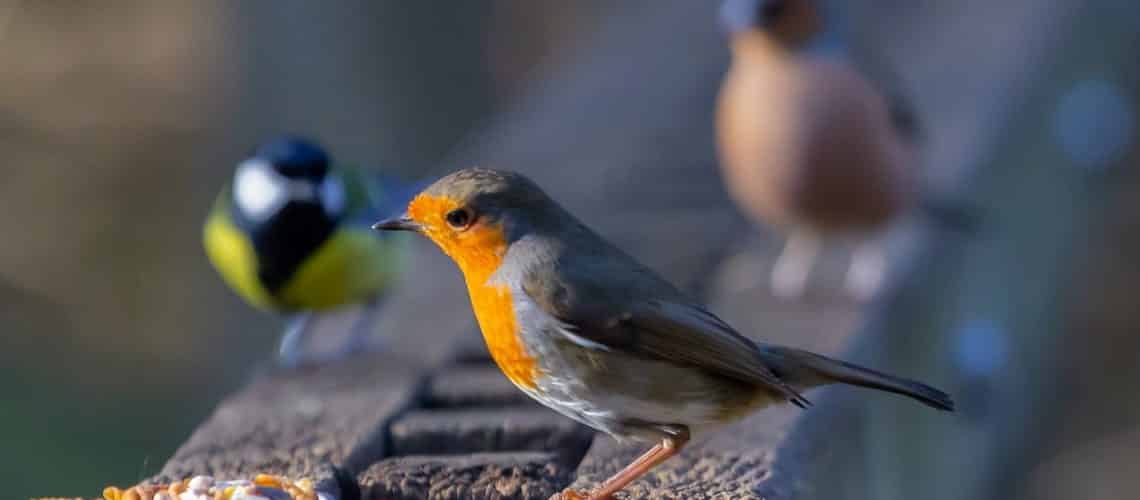
Bird Feeding in Autumn
Bird Feeding in Autumn
Autumn is most definitely upon us. We’ve all noticed the mornings getting darker, the evenings getting shorter and a little nip in the air. Those long summer evenings are fast becoming a distant memory as barbeques are cleaned and crammed into garages for their winter hibernation. We’re finding ourselves reaching for warmer clothes and cranking up the central heating. But it’s not just human behaviour that is altered as the seasons turn, our garden birds are altering their behaviour too.
For many garden birds Autumn is the time when they are finishing their annual moult. It takes a lot of energy to build new feathers so this can leave our feathered friends feeling, well, a little under par, particularly as temperatures drop and natural food sources become scarce. As we progress through Autumn, garden birds will increasingly come under pressure to find enough food to stay warm, healthy and maintain those all-important fat reserves. Fewer daylight hours will also reduce the amount of time they have to look for food, so what can we do to help?
Recommended Bird Food for Autumn
The simplest and most obvious way to give our garden birds a helping hand is by providing them with energy-rich foods helping to provide them with the essential nutrients they need to face the challenges that lie ahead.
There is a bewildering array of bird feed on the market, and different birds are attracted to certain bird foods. At this time of the year, you should offer a wide variety of bird feed including high-fat, high-calorie snacks as well as natural seed mixes and straights. Below are details of the nation’s most popular choices of bird feed:
Suet (Fat) Balls: The ultimate fatty snack for birds as the weather cools off. Suet balls are made up of fats such as lard or suet as the base then mixed with seeds, nuts and dried fruits. Suet / Fat balls provide excellent nutrition and a massive energy boost and appeal to a range of birds. They are also a fun, easy and no mess way to introduce younger kids into the world of bird feeding!
Sunflower Hearts: This Bulgarian super food is fast becoming one of the most popular bird feeds used to feed our wild garden birds. Sunflower Hearts for birds are packed with healthy oils, protein and have a high energy content which makes them great for birds in all weathers and stages of life.
Peanuts: These old reliables are rich in fibre, fat and protein making them perfect for this time of year. Peanuts are perfect bird feed for enticing a wide variety of bird species to your garden including tits, greenfinches, house sparrows, siskins and nuthatches.
Mealworms: They may look like something just landed from another planet, but these little wrigglers are adored by garden birds, particularly robins. They provide buckets of energy and protein and are a delicious treat for your garden birds. Mealworms are 100% natural and can be fed on their own or added to a bird feed mix.
Nyger Seed: High in healthy oils, proteins and fibre these tiny little seeds are a completely natural, healthy and nutritious bird feed. Nyger is a perfect bird feed for attracting small, beautiful birds such as goldfinches. Fed via a special Nyger Seed feeder it’s a must have on any bird enthusiasts shopping list.
Kitchen Scraps: Waste not Want Not! and our leftovers such as bread, cheese, potatoes and fruit also make and excellent addition to shop bought bird feed. Providing a variety of different food sources in your garden will not only mean that birds have a varied diet, but it will also attract a range of different birds. After all, like us, different birds have different foods that they prefer.
Winter is Coming!
Feeding the garden birds throughout Autumn means that they will be drawn to your bird feeders once Winter hits and its hugely rewarding watching an array of wildlife enjoying the garden and the habitat you’ve helped create for them.
So sit back and enjoy watching the beautiful colours on display from the finches, or the bullying strut of a robin in an environment you have helped create. Its good to know that every beakful of bird food that you’ve provided is helping the birds build vital reserves to help them survive the colder winter months.
Helping garden birds can be just as rewarding for you as it is for them!
Want to know more?
Check out the following links for even more information on what to feed garden birds this Autumn and Winter, and to help you identify just who is popping into your garden for a visit.
RSPB: www.rspb.org.uk
RSPCA: www.rspca.org.uk
British Trust for Ornithology www.bto.org
Wildlife Trust: www.wildlifetrusts.org
